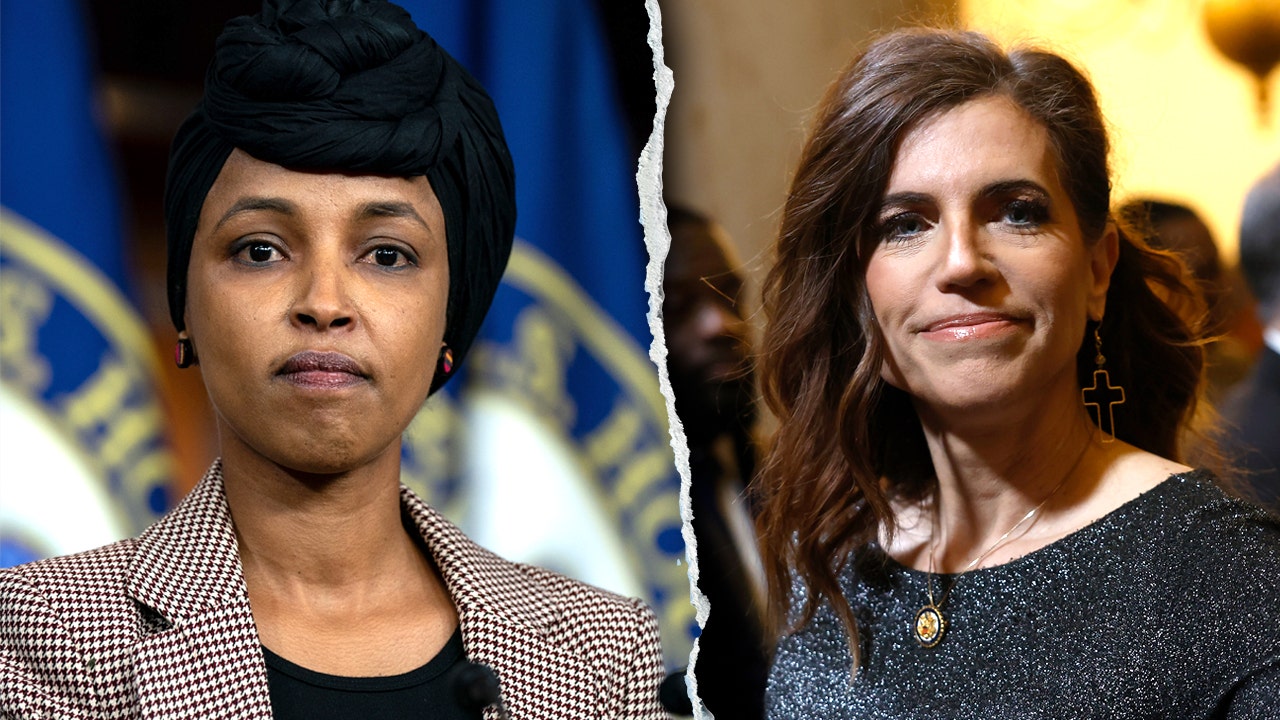President Donald Trump ignited a new political storm when he declared that Rep. Ilhan Omar of Minnesota should be impeached from Congress, a statement made after a Republican-led censure resolution against her failed.
Trump, speaking aboard Air Force One, escalated his remarks by calling Omar “scum” and repeating unsubstantiated allegations that she had once married her brother to gain U.S. citizenship.
The episode has once again brought Omar into the center of heated national debate, highlighting both Trump’s continued influence in Republican politics and the persistent controversies surrounding the congresswoman.
Trump’s latest broadside came while traveling, when he was asked about the censure resolution against Omar. The measure, led by Rep. Nancy Mace of South Carolina, sought to formally condemn Omar over comments she made about conservative activist Charlie Kirk.
The resolution, however, failed in the House after several Republicans defected. Some members were reportedly swayed by negotiations that required them to abandon a separate censure resolution against Rep. Cory Mills of Florida.
For Trump, the failed resolution was not enough. Speaking directly to reporters, he said Omar should face an even harsher penalty.
“I think she should be impeached. I think she’s terrible,” Trump declared. He then acknowledged his own history, referencing the two impeachments he faced during his presidency. “She should be impeached, and it should happen fast.”
These remarks quickly spread across political media, sparking intense reactions from allies and critics alike.
Not content with his comments aboard Air Force One, Trump took to Truth Social, his social media platform, to unleash a series of attacks against Omar.
In one post, he disparaged Somalia, Omar’s country of birth, calling it one of the “world’s most corrupt countries” and accusing its government of being riddled with bribery, embezzlement, and dysfunction.
“All of this, and Ilhan Omar tells us how to run America!” Trump wrote. “P.S. Wasn’t she the one that married her brother in order to gain Citizenship??? What SCUM we have in our Country, telling us what to do, and how to do it.”
The comments were inflammatory, drawing widespread attention not only for their language but also for reviving a claim about Omar that has circulated in conservative circles for years.
The allegation that Omar married her brother to gain citizenship has been a persistent narrative, frequently repeated by critics but never conclusively proven.
Multiple fact-checks have investigated the claim, with outlets examining marriage records, immigration timelines, and family histories. While inconsistencies in documents and explanations have fueled suspicion, no conclusive evidence has ever substantiated the claim.
Omar herself has denied the allegations, dismissing them as conspiracy theories rooted in racism and Islamophobia. Yet Trump’s decision to amplify the narrative once again ensures that it remains a point of political contention, regardless of the lack of definitive proof.
Beyond the personal attacks, Trump’s demand that Omar be impeached raised constitutional questions. The U.S. Constitution lays out the impeachment process for presidents, vice presidents, and federal judges, but it does not provide for the impeachment of sitting members of Congress.

Instead, the Constitution grants each chamber the authority to discipline its own members, including the power to expel with a two-thirds majority vote.
That threshold is a high bar. Republicans currently lack the two-thirds majority in the House necessary to expel Omar, and Democrats are unlikely to join such an effort.
This means that while Trump’s call for impeachment grabbed headlines, the practical reality is that Omar’s removal would require a rare and unlikely bipartisan consensus.
The last expulsion from Congress took place in late 2023, when former New York Republican Rep. George Santos was removed from office following a series of ethics scandals and criminal charges. Santos, now serving a prison sentence, became one of only a handful of lawmakers in U.S. history to be expelled.
Prior to Santos, expulsions were rare and typically tied to cases of treason or severe corruption. The fact that Trump invoked impeachment—a process not applicable to members of Congress—highlights both the extraordinary rhetoric of the moment and the unlikelihood of such a measure succeeding against Omar.
At the time of Trump’s remarks, Omar had not issued an immediate statement, but her past responses suggest she would likely frame the attacks as part of a pattern of harassment.
In previous instances, she has characterized Trump’s rhetoric as dangerous and Islamophobic, pointing to the risks it poses for her and her family.
Omar has long been a polarizing figure in U.S. politics. As one of the first two Muslim women elected to Congress, and a member of the progressive “Squad,” she has attracted both fervent support and fierce opposition.

Her criticism of U.S. foreign policy, support for Palestinian rights, and willingness to challenge party leadership have made her a lightning rod for controversy.
Trump’s comments about Omar reflect broader dynamics within the Republican Party. For many of his supporters, Omar represents everything they oppose in Democratic politics: progressive ideology, vocal criticism of U.S. institutions, and identity as an immigrant and Muslim woman.
By targeting her, Trump galvanizes his base while keeping attention on cultural and political divides.
For Democrats, Trump’s attacks reinforce concerns about his rhetoric and its impact on American democracy. Omar’s defenders argue that repeated personal attacks, especially those invoking conspiracy theories, contribute to a toxic political environment and put lawmakers at risk of threats and violence.
The failed censure resolution underscores the challenges of disciplining members of Congress in today’s polarized climate. Censure is a formal statement of disapproval but carries no practical penalties. It is often used to signal political disagreement rather than enforce consequences.
In Omar’s case, the resolution targeted remarks she had made about Charlie Kirk, but its failure highlights the limits of partisan efforts when members calculate the broader political implications.
For some Republicans, pursuing Omar too aggressively risked overshadowing their own legislative agenda or alienating moderate voters.
Observers note that Trump’s decision to attack Omar so forcefully fits into a broader strategy as he seeks to maintain dominance within the Republican Party.
By singling out high-profile Democratic figures, particularly those who represent progressive values, he positions himself as a defender of conservative America.
The choice of words—calling Omar “scum” and reviving debunked claims—also reflects Trump’s style of political communication. He often uses inflammatory language to command media attention, knowing that the controversy itself keeps him in the spotlight.
For his supporters, such bluntness is a sign of authenticity; for his critics, it is a dangerous erosion of political discourse.
Trump’s disparagement of Somalia adds an international layer to the controversy. By attacking Omar’s country of origin, he reignited criticism of his past comments about immigrants and developing nations.
Omar’s supporters argue that such rhetoric perpetuates xenophobia and undermines America’s role as a diverse democracy.
For Somalia, already struggling with political instability and corruption, Trump’s remarks risk reinforcing negative stereotypes. While his words may resonate with segments of the U.S. electorate, they also fuel resentment among immigrant communities who feel unfairly targeted.
The clash between Trump and Omar also raises questions about the future of congressional discipline. As political battles become more personal and public, tools like censure and expulsion are increasingly viewed through partisan lenses.
The idea of impeaching a member of Congress—constitutionally impossible—illustrates how rhetoric can outpace reality in the heat of political conflict.

Some lawmakers worry that constant threats of censure or removal undermine the seriousness of congressional accountability. If every controversial statement becomes grounds for disciplinary action, the process risks losing credibility.
Yet, ignoring such controversies also carries risks, particularly when inflammatory rhetoric fuels division.
For now, Omar remains in office, and the failed censure resolution ensures she will continue to serve without formal reprimand. Trump’s attacks, however, guarantee that she remains in the political spotlight.
With the next election cycle looming, both Democrats and Republicans are likely to use the controversy to energize their respective bases.
For Democrats, Omar’s resilience against repeated attacks may become a symbol of defiance in the face of extremism. For Republicans, her polarizing positions and controversies provide a convenient target.
As for Trump, his ability to dominate headlines with a few remarks demonstrates the enduring power of his voice in American politics. Whether or not his call for Omar’s impeachment gains traction, the attention it generated reinforces his role as a central figure shaping political discourse.
Trump’s demand that Ilhan Omar be impeached from Congress, coupled with his inflammatory remarks on Air Force One and Truth Social, created another flashpoint in an already volatile political landscape.
While constitutional realities make impeachment impossible, the rhetoric itself reveals much about the current state of American politics: deeply polarized, fueled by personal attacks, and shaped by media amplification.

For Omar, the controversy is both a burden and an opportunity—an ongoing challenge to her safety and credibility, but also a chance to galvanize supporters who see her as a target of unfair attacks.
For Trump, it is another example of his strategy to dominate the conversation, rally his base, and frame the political debate on his terms.
The episode underscores the fragility of political discourse in America today. In an environment where accusations can overshadow facts and rhetoric can outpace constitutional reality, the stakes remain high for both leaders and the public they serve.



-1750129801-q80.webp)

